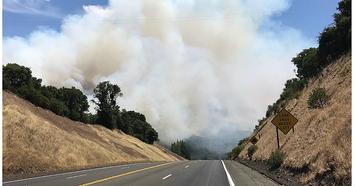
If there’s an award for environmental virtue signaling, California would win the prize. Yet for all the constant self-promotion, shameless grandstanding and endless moralizing, perhaps it’s time to reconsider the impact, and failures, of our current green obsessions.
Take the recent fires that Gov. Jerry Brown, predictably and with little evidence, blamed squarely on climate change. If he wanted to find the immediate culprit, he might be better off looking in a mirror. Earlier this year the Little Hoover Commission placed primary blame for increasing ferocity of fires on poor forest management practices, largely at the behest of the powerful green lobby. Saying that this echoes Donald Trump is true, and guaranteed a Pavlovian reaction from the progressive press, but even the blusterer in chief is occasionally right.
Even before the most recent fires, estimates indicated that the magnitude of greenhouse gas emissions from the state’s poorly managed forests — the forest lands that cover 33 percent of our territory — greatly increased the state’s emissions. For years, green lobbying has pushed policies creating vast areas with dense underbrush and stunted tree growth, just perfect to incubate catastrophic wildfires. California could use this wood for building materials or sustainable energy instead of buying virtually all its building material wood products from China, Canada or other states.
The limits of good intentions
Overall, California’s drive for environmental perfection — requiring reductions roughly twice that required by the Paris accords — has not been notably successful, notes a recent Chapman University report. Since 2006, the state’s reductions in GHG rank a mere 35th among the states and 41st when adjusted for population growth. Even Texas, that bogeyman of fossil-fuel excess, has been reducing its per-capita emissions more rapidly.
Worst still, this posturing has made California, and other similarly minded jurisdictions, less congenial places for middle-class homeownership or employment. Meanwhile the goodies, such as giving tax breaks from cap-and-trade funds for electric cars — we spend 10 times as much on those subsidies than on forest clearance — or solar rebates that go to generally affluent wealthy homeowners and well-connected corporations.
Even though California’s green policies will contribute almost microscopically to global GHG reduction, the state seem determined to keep bolstering its enviro-cred on the backs of its vulnerable citizens. This is done through ever more stringent land-use controls, spending billions on boneheaded schemes like high-speed rail, and ever greater regulation of the basic services of water and power. Green-oriented policy shops, including from former Clinton Chief of Staff John Podesta, have other clever ideas such as depressing already low birthrates or even repealing basic property rights.
Is there an alternative?
For all its scientific pretension, the green movement is increasingly theocratic in nature, with a powerful preference for dictatorial approaches associated with hierarchical regimes like China. It regards any debate relating to climate or even mitigating steps unnecessary while dissidents and fossil-fuel firms are threatened with prosecution.
Since human beings created global warming, it appears, the green theologians believe the species should be punished by consistently ratcheting down our quality of life. This fits well with Brown, a onetime Jesuit and scion of a well-heeled, and powerful, family for whom austerity has been a constant theme, going back at least to his Jesuit seminary days. Who, after all, needs single-family houses or the flexibility of a car? Other green grandees, including Prince Charles and Stewart Brand, have even praised slum life for conserving resources. Our future: goodbye Lakewood, hello Mumbai.
Perhaps this is a future we don’t want, particularly to pursue supposed Paris-decreed policies embraced by the leading hectoring countries, like Germany — are failing to meet. Rising GHG emissions, linked to greater coal burning, have challenged Merkel’s legacy as the “Climate Chancellor” of Europe. As for China, whose fossil fuel emissions are greater than the U.S. and the EU combined, we can expect more GHG on the horizon even as the supposedly unenlightened U.S. continues to drive down emissions.
A better approach, particularly at a time when the state’s economic growth is slowing, would be to prioritize resilience over faux puritanism. If we are indeed to face more droughts or rising temperatures, let’s adopt people-friendly GHG reducing policies. These could include encouraging home-based and dispersed work to get people closer to employment, fighting desertification through building better storage capacity for wet years, updating the state’s increasingly decrepit dams, boosting, as well as investing in, new energy-saving technologies.
For millennia, great cities, and countries, have dealt with major environmental challenges. Ancient cities in the Middle East as well as Rome built aqueducts to bring water from the high mountains for their citizens — much like California did in the last century. Others, like the Netherlands, have engineered their environment to keep water out. Better than donning a hair shirt to fight climate change, maybe we should be putting our engineers and planners to work finding the best way to adapt to looming environmental challenges, as regions have done since the earliest times.
This piece originally appeared in The Orange County Register.
Joel Kotkin is executive editor of NewGeography.com. He is the Roger Hobbs Distinguished Fellow in Urban Studies at Chapman University and executive director of the Houston-based Center for Opportunity Urbanism. His newest book is The Human City: Urbanism for the rest of us. He is also author of The New Class Conflict, The City: A Global History, and The Next Hundred Million: America in 2050. He lives in Orange County, CA.
Photo by Mendocino California Sheriff's Department [Public domain], via Wikimedia Commons












